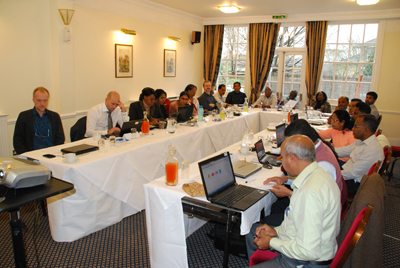FORUT
FORUT is a Norwegian development organisation established in 1981 by three NGOs specialized in alcohol and drug prevention; IOGT Norway, Juvente and Juba. FORUT’s activities are financed through fund-raising campaigns and grants from the Norwegian government. FORUT has project activities in Sri Lanka, Nepal, India, Sierra Leone, Malawi and Zambia.

FORUT will contribute to the social mobilisation of the poor and oppressed in their struggle for human rights, helping those groups to reform society to be responsive to their rights and needs. Solidarity with the poor means putting respect above pity, struggling together with underprivileged groups. FORUT draws a clear line against providing gifts or charity, and instead aims to participate in the mobilisation and activation of human resources to challenge unjust, repressive and exploitative societal conditions and organizations. We work to achieve a higher economic standard for the poor, but also to secure their daily lives, increase their freedom and integrity, strengthen their social rights, and advance human development.
FORUT works in three programme areas:
- Alcohol drugs and Development (ADD)
- Child Rights and Development
- Gender Equality and Women’s Rights
 Partnership
Partnership
The photo to the right shows representatives of FORUT's partner network gathered in London in 2012 to discuss how to develop systems for documenting results in the three programme areas.
All FORUT activities are partnership based and guided by the principle of upholding the human dignity of the participants who are partners in the process.
Mutual respect. A partnership can be most successful and fulfilling if it is based on mutual respect. Such respect requires that we constantly strive to offset the power/information/resource imbalances that can occur in a donor-recipient relationship. FORUT’s creation of partnerships that focus on common goals with partner organizations helps establish strong bonds based on mutual respect.
Democracy, transparency, and participation. The health of such partnerships depends on establishing transparent intentions, modus operandi, organisational structure and priorities, and possible alternative agendas. FORUT will establish partnerships with organisations based on principles of democratic participation.
Establishing effective working relationships with partners also depends on defining clear roles and responsibilities for the partners and establishing guidelines for the type of relationship.
Building networks. In addition to working with its partners, FORUT will also strive to build a network of other NGOs, agencies, and organizations that share our interests in development, alcohol and drugs, and other fields.
Principles for fundraising. FORUT’s public fundraising in Norway will be guided by the principle of upholding the human dignity of the people and groups on whose behalf the funds are being raised. The informational messages contained in the fundraising materials and activities will be fact based and aimed at promoting tolerance, humanitarianism, open-mindedness, a sense of global responsibility and human rights.
Mobilising local resources. A guiding principle in development activities recognizes the importance of mobilising local resources, rather than merely delivering services to a population.
- We believe that the potential for development exists everywhere. FORUT wants to be a spark plug, strengthening people’s faith in their own power and capabilities. We want to do this with total respect for local knowledge and practice.
- Local resources increase the development impact of the intervention and secure sustainability.
- Assistance, by itself does not solve the problems, but starts a process.
- Only the people themselves can genuinely achieve their own liberation and development.
- Recipient responsibility differs markedly from charity, prevents dependency on aid, creates ownership, provides a greater chance for relevant interventions, and facilitates adapting to a cultural context.
- Development activities mean working as a catalyst by releasing the inherent potential within communities rather than coming in and “doing the job.”
See more information at the FORUT web site
